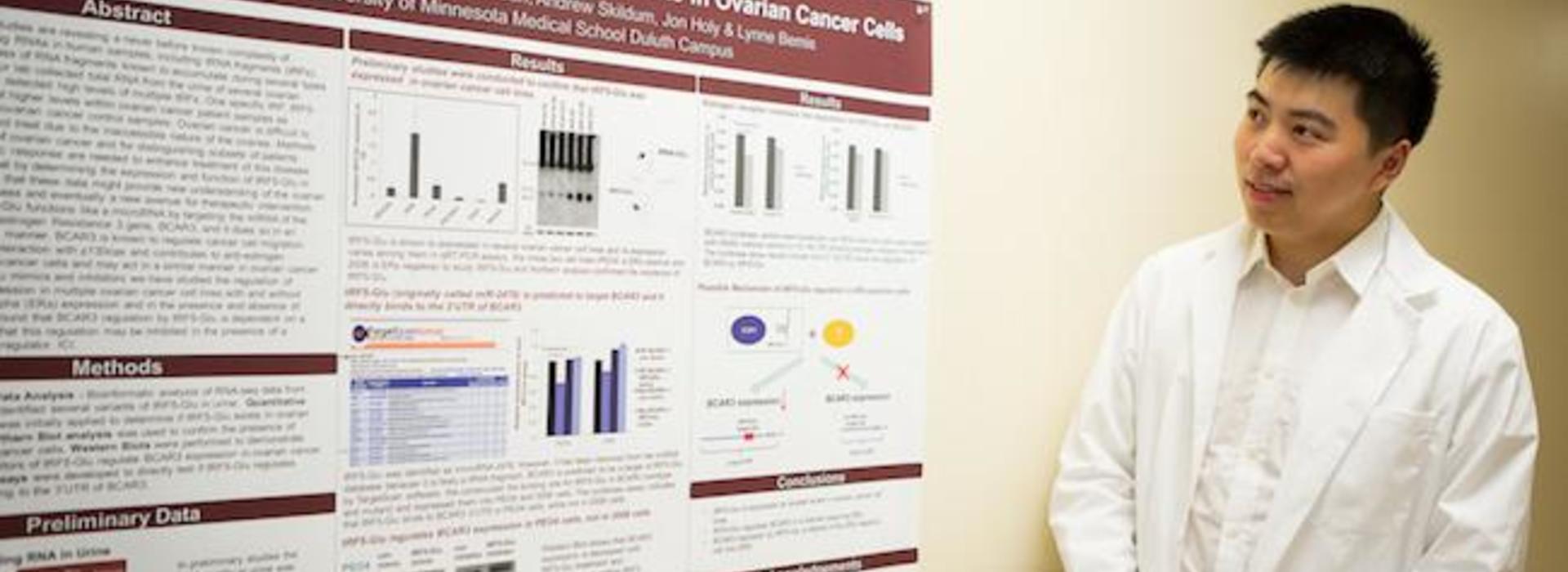
Research Snapshot: BMBB Graduate, Kun Zhou Highlights Thesis Defense on tRNA Fragments, Expression and Function in Ovarian Cancer
In academia, a thesis defense is a big step towards pursuing a postdoctoral position, or advanced training. Recent Biochemistry, Molecular Biology and Biophysics (BMBB), Program graduate, Kun Zhou reflects on his time collaborating in the research labs with the Biomedical Sciences Department at the Medical School, Duluth Campus, and next steps towards his postdoctoral fellowship at Harvard University.
Tell us about the BMBB Graduate Program and what brought you to the Duluth Campus?
After obtaining my undergraduate degree in China, I wanted to go abroad to further my studies in Biology. In 2012, I was accepted into the BMBB Graduate program under the College of Biological Sciences, based on the Twin Cities Campus. The program fit my interests by focusing on the molecular mechanisms of metabolic diseases and cancer. After exploring the different options, I became more interested in Dr. Lynne Bemis’ lab at the Medical School, Duluth Campus that addressed RNA molecules as biomarkers for earlier cancer detection. I came up here for a visit of the campus to see what it had to offer, and I’ve been here ever since.
Research and Thesis Defense
We identified tRNA fragments in the urine of ovarian cancer patients, and began exploring the role of these molecules to see if it can serve as a biomarker, or place any function around cancer cells. We confirmed that the tRNA fragments can act much like microRNA, and can be treated cells to regulate the gene expression. And, that gene turns out to be important in cancer cells, because when we decrease that gene’s expression, it actually decreases the cancer cell proliferation. It’s a significant finding, but there’s still so much more research to be done.
Next Steps
Starting October 2017, I will be heading to Harvard University to conduct my postdoctoral studies under the lab of Dr. Bruce Zetter, and training at Boston Children’s Hospital. My new research will focus on cancer treatments, and it’s very possible that I will continue to study the tRNA fragments.
I want to thank Dr. Bemis, my advisors and the good people that I’ve met here at the U of M. I will never forget this place.
The College of Biological Sciences, Biochemistry, Molecular Biology and Biophysics Graduate Program at the University of Minnesota integrates exceptionally strong research with a broad education in order to guide students to the edge of transformative frontiers in the modern biological sciences. BMBB students fuse ideas from dynamic fields like biophysics, genomics, proteomics, structural biology, and more to investigate game-changing questions about the fundamental mechanisms of life.